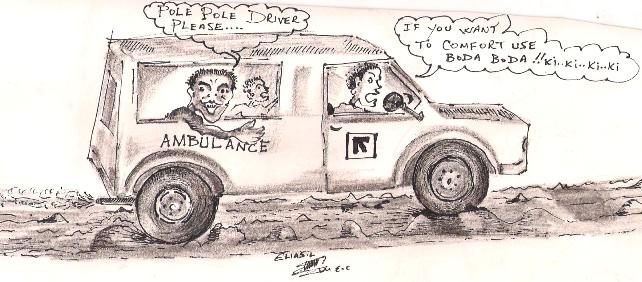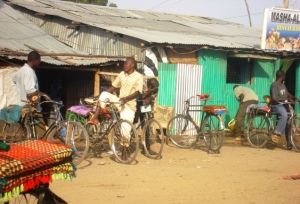Volume 1, Issue 3 / February 2009
Dust storms, spare parts, and UNHCR head count drive up prices of boda-boda bicycle taxis, posing a dilemma for would-be customers
 What are the solutions for a transportation crisis if there are no alternatives? Boda-boda bicycle taxis are the key transportation in Kakuma, but prices are rising due to dust storms, rising costs of spare parts, and the UNHCR card exchange.
What are the solutions for a transportation crisis if there are no alternatives? Boda-boda bicycle taxis are the key transportation in Kakuma, but prices are rising due to dust storms, rising costs of spare parts, and the UNHCR card exchange.
Fares have risen nearly 50 percent for all boda-boda taxi routes. Fare to travel from town to Kakuma Two has risen from 70 Ksh to 100 Ksh, while fare to Kakuma Four has risen from 100 Ksh to 150 Ksh.
When UNHCR announced the refugee card exchange, many refugees traveled to Kakuma from their usual places of residence elsewhere in Kenya. The sudden influx in population created higher demand for taxi services and higher prices.
Recent severe dust storms have also driven prices up due to the difficult working conditions. James, a boda-boda driver, reports, “The customer is sitting behind relaxing and the dust is getting into my eyes and it’s hard to drive the bicycle!”

According to Joseph Akran, more then 700 individuals from the local community are now registered as boda-boda drivers. Bicycle taxis are a popular career choice among locals because it does not require technical knowledge or schooling, while producing enough profit to yield savings.
One boda-boda driver, Omar Moaw, reports that he earns around 500 Ksh per day unless wind storms dampen profits. Joseph Akran says he has been working since 2001 and now has 15 goats in the village from his daily savings.
Each boda-boda taxi is registered with a local registration office and filed with the police. Customers may note the boda-boda’s plate number for their reference, and thefts and accidents are reported to the nearest police station.
According to Joseph Akran, a local boda-boda driver, the registration of boda-boda also allows one to secure a spare parts loan.
As prices are generally negotiable, one should be careful not to pay more than the going rate. The price of the boda-boda station from town to Kakuma One is 20 Ksh; from Kakuma One to Kakuma Main Hospital 20 Ksh, and from Main Hospital to Kakuma Two is 30 Ksh. But expect prices to rise when dust storms howl through town.
Boda-boda drivers say prices may go back to normal price after the dust storms have subsided, but they also caution that rising costs of spare parts may lead to permanently higher fares.
According to Wikipedia, boda-boda taxis are a uniquely functional taxi service boasting originality and history. Bicycle taxis first arose in response to the need for transport on the Kenyan-Uganda border. To ferry customers between the border towns of Malaba, Kenya, and Busia, Uganda, bicycle owners would shout “boda-boda” (border-to-border) to potential customers.
Here in Kakuma, the boda-boda system was re-discovered in 1997 when Somali refugees were transported to Kakuma from camps on the coast. Sudanese and Somali Bantu refugees began working as boda-boda drivers. Before that time, the host community was not aware of the two-wheeled taxi system. Now, they comprise the majority of boda-boda drivers in Kakuma.
Says Ekay, a local boda-boda driver, “After the Sudanese Lost Boys were resettled to the U.S., I started a boda-boda taxi. I bought the bicycle of a Sudanese going to America.”
When asked for the name given to boda-bodas in the local Turkana language, he laughed and replied “Aklelat-aklelat.”
